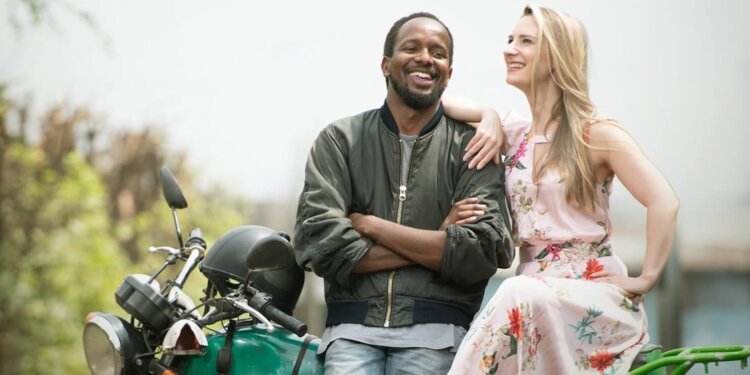Romcoms don’t come any more textbook than Boda Love these days. We’re in an age where everyone is trying to redefine the genre with avant-garde takes on love and apres-garde views on romantic entanglements, so it is almost a breath of fresh air to encounter the innocence of this round-the-way film. Well, almost. One begins to see why this is among the most deconstructed genres ever.
It all begins when Charlotte, a British woman, flies to Nairobi, looking forward to seeing her fiancé. Billed as ‘Notting Hill meets Nairobi’, it isn’t long before the damsel gets distressed, spurred on by the theft of her suitcases. For some reason, probably the distress, she urges Boda Guy, Jabari, to let her crash at his place. He begrudgingly accepts because he lives with his whole family, mother and all. They’re an off-beat but homely set. Charlotte is never thrown off by them, not even in the beginning. At first, she’s mostly just hung up on her own issues, but soon enough, a romance burgeons between herself and Jabari, while her previous fantasies fade into mist.
It’s so indicative of our modern culture and upbringing. We’ve all been raised to believe we can be happy once we’ve achieved certain set criteria, and then maybe we have a shot. In reality, happiness is often found when you aren’t looking for it. But here is Charlotte. She’s essentially the victim of an internet romance scam. That whole psychological make-up is, of course, overlooked and ignored given that Boda Love is supposed to be part comedy, but the film itself has the fabric of the more pitiful romance stories, something like the old movie Marty. In this case, both principals are sad. Jabari feels like he’s playing out of his league, and Charlotte is having a hard time coming to terms with reality.
Duncan Murunyu plays Jabari with a puppy-dog face plastered throughout the film. It works, but it’s only good for one thing: pity. Greer Dale-Foulkes’ Charlotte, on the other hand, is given more to chew on emotionally, and she delivers it quite convincingly. Highlights for me were every scene which featured Charlotte and Keith Chuaga’s Inspector Mungai as they went back and forth with each other. In fact, the funniest moments of the movie were these scenes. The two leads, Jabari and Charlotte, rarely, if ever, get any comedic zings out of their scenes, but what they lack in funny, they make up for in chemistry. They feel good together. It’s also pleasant to see Justin Mirichii from Shimoni crack a smile and play somebody more well-adjusted than his previous high-profile role.
Boda Love is directed in a rather pedestrian way, where the style matches the simplicity of the substance. The film is shot, lit, and blocked like a TV show, with minimum cinematic imagination. The film features a beautiful soundtrack, with music from Billy Black, Njoki Karu, Tetu Shani and Charisma, which helps.
The romantic-comedy formula is adhered to the very end. The third-act denouement is as predictable and feel-good as the movie prepares you to expect. The girl turns away from the boy, the girl runs back, but the boy also heads towards her direction, and they meet each other, lovingly, halfway.
Comedic elements enable the geo-cultural intricacies to be overlooked, and we wouldn’t want to explore them in a romantic comedy, anyway. This film reminded me of another similar title from 2005, The White Masai, about a white woman falling in love with a Maasai man. That was a ‘serious’ movie, based on a ‘serious’ book. In that film, the romance was played straight for drama, and it wasn’t funny at all. The whole point of the story was that there was this gentrified white woman who fell head over heels for this Maasai man. The film takes the story to its logical end, where the cultural differences hinder their relationship; while in Boda Love, the storymakers decide to end the tale at the moment of the most satisfying high.
In the end, Boda Love feels good, and makes one laugh once or twice, but doesn’t do anything new, or anything better than what we’ve all seen before.
Enjoyed this article?
To receive the latest updates from Sinema Focus directly to your inbox, subscribe now.










